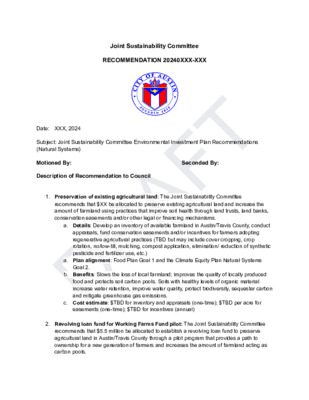5. Proposed EIP Natural Systems Recommendations — original pdf
Backup

Joint Sustainability Committee RECOMMENDATION 20240XXX-XXX Motioned By: Date: XXX, 2024 Description of Recommendation to Council Subject: Joint Sustainability Committee Environmental Investment Plan Recommendations (Natural Systems) Seconded By: D R A F T 1. Preservation of existing agricultural land: The Joint Sustainability Committee recommends that $XX be allocated to preserve existing agricultural land and increase the amount of farmland using practices that improve soil health through land trusts, land banks, conservation easements and/or other legal or financing mechanisms. a. Details: Develop an inventory of available farmland in Austin/Travis County, conduct appraisals, fund conservation easements and/or incentives for farmers adopting regenerative agricultural practices (TBD but may include cover cropping, crop rotation, no/low-till, mulching, compost application, elimination/ reduction of synthetic pesticide and fertilizer use, etc.) a. Plan alignment: Food Plan Goal 1 and the Climate Equity Plan Natural Systems b. Benefits: Slows the loss of local farmland; improves the quality of locally produced food and protects soil carbon pools. Soils with healthy levels of organic material increase water retention, improve water quality, protect biodiversity, sequester carbon and mitigate greenhouse gas emissions. c. Cost estimate: $TBD for inventory and appraisals (one-time); $TBD per acre for easements (one-time); $TBD for incentives (annual) Goal 2. 2. Revolving loan fund for Working Farms Fund pilot: The Joint Sustainability Committee recommends that $5.5 million be allocated to establish a revolving loan fund to preserve agricultural land in Austin/Travis County through a pilot program that provides a path to ownership for a new generation of farmers and increases the amount of farmland acting as carbon pools. a. Details: A collaboration with the Conservation Funds Working Farms Fund and local agricultural nonprofits will acquire and permanently protect small to mid-sized farms, and provide a pathway for underrepresented farmers to own their own farms b. Plan alignment: Food Plan Goal 1 and the Climate Equity Plan Natural Systems Goal 2. c. Benefits: Slows the loss of local farmland, improves the quality of locally produced food, protects carbon pools, and serves as a template for program replication. d. Cost estimate: $5.25M to establish a revolving loan fund; $250K annually for operational expenses d. Cost: $350K (TBD) real-time response to leaks, solar panel outages etc. and improving management of water and electricity usage in City parks, pools and buildings. 3. Energy and water dashboard for City facilities: The Joint Sustainability Committee recommends that $350K (TBD) be allocated to create a consolidated energy and water dashboard to automate data collection and track real-time usage across city departments for improved resource management and conservation. a. Details: Consolidate disparate data sources throughout the City’s operations to reduce complexity, streamline management and conservation b. Plan alignment: Climate Equity Plan Natural Systems Goal 4. c. Benefits: Advances the sustainability of City operations by enabling near D R A F T and Recreation Department Land Management Plan c. Benefits: The Austin Civilian Conservation Corp invests in people and projects that have a direct impact on climate justice and builds more equitable pathways to employment, organizational leadership, entrepreneurship and strengthens networks of support for those most impacted by a changing climate d. Cost: $TBD for programs supporting Natural Systems Programming (annually); $TBD to support Environmental Education Programming (annually); $TBD to support Zero Waste Programming and training (annually). a. Details: Provide permanent funding to support existing services protecting critical ecosystems on preserves and parkland, environmental education and program development and training for computer refurbishment for non-profit distribution b. Plan alignment: Climate Equity Plan, Austin's goal of zero waste by 2040, Parks 4. Permanent funding for the Austin Civilian Conservation Corps: The Joint Sustainability Committee recommends that $XX annually be allocated for permanent funding to support the Natural System, Environmental Education and Zero Waste programs of the Austin Civilian Conservation Corp program 5. Ensure full and ongoing funding for City Council resolution 20240418-051 to support a comprehensive public tree inventory for the city of Austin: The Joint Sustainability Committee recommends that $TBD be allocated to collect data on Austin’s urban forest in order to ensure comprehensive urban forest management across city departments, including the creation of coordinated Departmental Operational Plans to support ongoing implementation of the Urban Forest Master Plan. a. Details: Provide initial funding, as well as ongoing maintenance funding, to execute a comprehensive tree inventory across all city-owned property, as directed by City Council resolution 20240418-051. Collecting this data will allow the city’s Urban Forester to complete a comprehensive urban forest management plan, including a robust tree planting and tree replacement plan. Data collection methods should follow nationally recognized best management practices in acquiring vegetation information for purposes of maintenance, planning, canopy goal establishment, and other comprehensive urban forest management efforts, and should be done in collaboration with federal, state, regional, and local governmental jurisdictions, community nonprofits, and the private sector where appropriate. Data should be stored in formats that can be easily shared across departments and stakeholders. b. Plan alignment: Urban Forest Master Plan and the Climate Equity Plan Natural Systems goal 3 (50% citywide tree canopy). c. Benefits: Urban forests serve as carbon sinks that promote climate mitigation efforts, but at present the city does not have a comprehensive tree planting plan that would allow for effective urban forest planning and maintenance. Developing and maintaining a robust data catalog of existing trees is a necessary first step to ensuring that the city can maintain the health of the overall tree ecosystem, as outlined in the Urban Forest Master Plan, and also supports the increase of our overall tree canopy footprint to the 50% goal proposed in the Climate Equity Plan. D R A F T d. Cost: $TBD (initial)